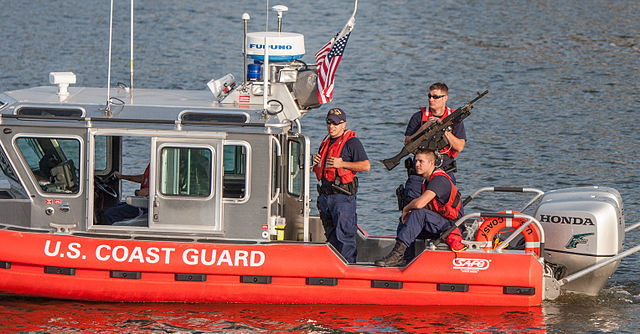The U.S. Coast Guard offloaded over 4,800 pounds of cocaine worth more than $63 million in Florida on Thursday. The drugs were seized during interdictions in the Caribbean Sea, including one operation involving gunfire that resulted in a vessel catching fire and sinking.
The interdictions took place approximately 24 miles north of Puerto Cabello, Venezuela, and were part of the Coast Guard's ongoing efforts to combat drug smuggling in international waters. "The U.S. Coast Guard and our international partners continue to interdict drug smuggling ventures in international waters to reduce the flow of illicit drugs, disrupt transnational criminal organizations, and increase interoperability with our partner nations and interagency partners," the Coast Guard stated in a social media post.
The first interdiction was particularly intense. A Royal Netherlands Navy ship, equipped with a U.S. Coast Guard detachment and a helicopter interdiction tactical squadron, identified a vessel suspected of smuggling drugs. When ordered to stop, the vessel increased its speed and changed direction towards a Dutch Caribbean Coast Guard boat. In response to the life-threatening situation, U.S. and Dutch Coast Guard crew members discharged their weapons, causing the vessel to catch fire and sink. Three suspected smugglers went overboard and disappeared, leading to a suspended search on Tuesday evening.
"The decision to suspend the search was not taken lightly and the incident remains under investigation," said Lt. Cmdr. John W. Beal of Coast Guard District Seven.
Details of the second interdiction were not immediately available, but both operations highlight the ongoing risks and challenges faced by the Coast Guard in its mission to intercept drug traffickers.
@USCG Cutter Resolute's crew offloaded more than 4,800 pounds of cocaine, worth over $63 million, at @PortEverglades, Thurs. This offload was the result of 2 interdictions by HNMLS Groningen with embarked USCG LEDET 110 and HITRON, 24 miles north of Puerto Cabello, Venezuela. pic.twitter.com/efJcbD8f4i — USCGSoutheast (@USCGSoutheast) June 6, 2024
This recent haul follows a series of significant drug seizures by the Coast Guard. Last year, the Coast Guard offloaded over nine tons of cocaine from six separate events in San Diego, valued at more than $239 million. The largest of these seizures involved a narco-submarine carrying over 5,500 pounds of cocaine. The Coast Guard has also uncovered innovative smuggling methods, such as hiding drugs in vats of jalapeño paste and using remote-controlled submarines.
International cooperation remains a key component of these operations. In the recent interdictions, the collaboration between the U.S. Coast Guard and the Royal Netherlands Navy was crucial. The Dutch ship, equipped with U.S. personnel, played a significant role in identifying and intercepting the suspect vessels. This cooperation is part of a broader strategy to leverage international partnerships in the fight against drug trafficking.
The seizure and shootout come shortly after another major operation in which a separate Coast Guard crew offloaded $468 million worth of cocaine in San Diego. This haul was the result of eight separate operations off the coasts of Mexico and Central and South America.
International drug traffickers frequently use various types of vessels to transport narcotics. Recent months have seen the interception of numerous drug-smuggling vessels, including speedboats and semi-submersibles. For instance, Italian police recently seized a remote-controlled submarine intended for drug trafficking, and the French navy captured 2.4 tons of cocaine from a Venezuelan fishing boat.
In March, authorities announced the seizure of nearly four tons of cocaine from a speedboat in the Caribbean Sea off Colombia. Earlier that month, a British warship and an American patrol aircraft intercepted another speedboat near the U.S. Virgin Islands, recovering about 6,000 pounds of cocaine.
The Coast Guard's efforts are part of a broader strategy to combat drug trafficking and protect national security. "The Coast Guard is America's primary maritime law enforcement agency, and our crews work hard to safely bring suspected smugglers to face federal prosecution in the United States for alleged crimes," said Lt. Cmdr. Beal.




